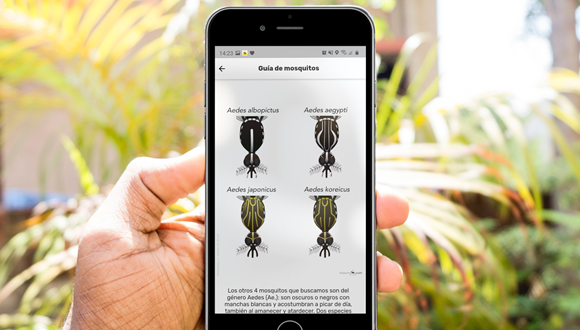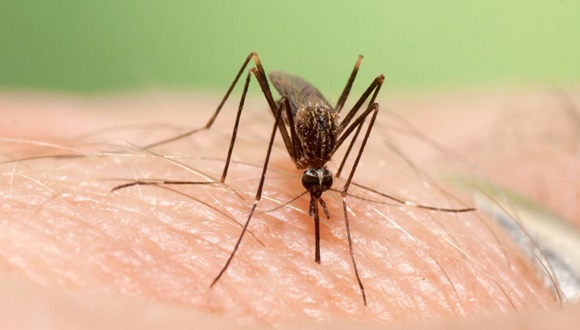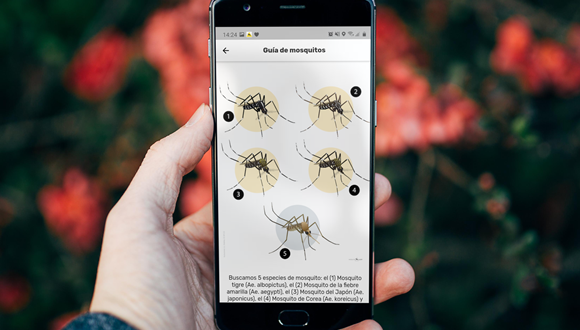The citizen science project Mosquito Alert is launched in Europe to track the spread of mosquitoes
The Mosquito Alert app is now available in 18 European countries from Europe and will help monitoring the spread of these insects, which can transmit viral diseases such as dengue or Japanese encephalitis. Is produced by the European network AIM-Cost Action and the H2020 project Versatile Emerging infectious disease Observatory (VEO).

Through the app, people can take pictures and try to identify mosquitoes that they see. The information is passed along to a team of more than 50 expert entomologists, who validate the observations. The information collected by the new app is essential to develop the project selected in the "la Caixa" Big Mosquito Bytes Foundation Health Call, in which scientists from CEAB-CSIC, UPF, the Max Planck Institute for Demography, the National Epidemiology Center (CNE) CIBERSP / ISCIII and CREAF. The project combines citizen science and big data to develop innovative models to predict the risk of outbreaks of some of the diseases transmitted by the tiger mosquito
Recent outbreaks of dengue, chikungunya, and West Nile virus across Europe are a stark reminder of the risk of rapidly expanding native and invasive mosquito populations linked with climate change. According to data from the European Center for Disease Prevention and Control, as of September 2020, Europe has registered 9 local cases of dengue (5 in Italy and 4 in France) and 168 cases of West Nile fever, of which 77 have been in Greece (with 9 deaths), 49 in Spain (with 4 deaths), 29 in Italy, 9 in Germany and 4 in Romania. And a 2019 study estimated that, if greenhouse gas emissions continue to increase, by 2080 400 million people in Europe will be exposed for the first time to viral transmission caused by mosquitoes of the Aedes genus, which can cause diseases such as zika, chikungunya and dengue.
Mosquito Alert has been used in Spain for five years, where volunteers have reported more than 18,300 mosquito sightings. These observations have been used to monitor the expansion of the Asian tiger mosquito (Aedes albopictus), a species originally from South Asia that can transmit dengue, chikungunya and yellow fever. The app also allowed for the early detection of the Asian bush mosquito (Aedes japonicus), an invasive species that can cause West Nile fever.
The new version allows users to report mosquitoes of five different species of concern in Europe: the Asian tiger mosquito (Aedes albopictus), the yellow fever mosquito (Aedes aegypti), the Asian bush mosquito (Aedes japonicus), Aedes koreicus and the common house mosquito (Culex pipiens).

“In recent years we are observing how new invasive mosquitoes, and the establishment of efficient mosquito vector species, like the Asian tiger mosquito, have been responsible for the epidemic transmission of chikungunya in Italy in 2007 and 2017, both with hundreds of cases, and autochthonous dengue and Zika cases in southern Europe,” says Alessandra Dellatorre coordinator of the AIM Cost EU project.
Mosquito Alert aims to reproduce the Spanish success across Europe, and to create local communities of citizen scientist volunteers. "We will never be able to achieve real-time global surveillance without new ways of monitoring mosquito distributions and activity patterns. Traditional means of data collection are too expensive to cover a national scale for long," explains Frederic Bartumeus, co-director of Mosquito Alert and ICREA researcher at CEAB-CSIC and CREAF. "Citizen science based on smartphones is a way forward which we want to promote in Europe."
Scientists stress that Mosquito Alert does not aim to replace traditional surveillance methods, but rather to complement them. Its main assets are its flexibility and the ability to assess all the data scientifically. It also creates an efficient communication channel between citizens, scientists, and public health managers, acting as an early warning system and raising awareness among the public of the potential risk of these insects.
The app allows participants to provide information on mosquito biting activity, as well as sightings, a feature that was not present in previous versions. "The information about bites is valuable because it allows us to better understand the networks between mosquitoes and humans through which diseases circulate", explains John Palmer, co-director of Mosquito Alert and professor at Pompeu Fabra University.

Another additional feature is the app will now allow to monitor the common mosquito (Culex pipiens complex), which is increasingly of concern due to its role in the transmission of West Nile virus.
“The common house mosquito is a native species, but one that has an increasing epidemiological impact in Europe, which makes it necessary to monitor their populations, as is done with the invasive mosquitoes. In recent years, hundreds of local cases of West Nile fever have been counted in Europe and neighboring countries, with a peak in 2018 reaching 2,083 cases in humans and 180 deaths”, says Marion Koopmans coordinator of the VEO EU project.







